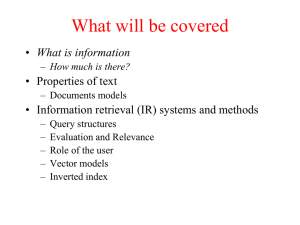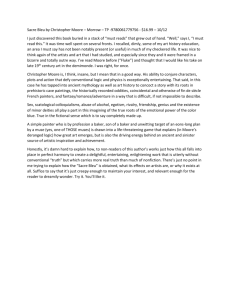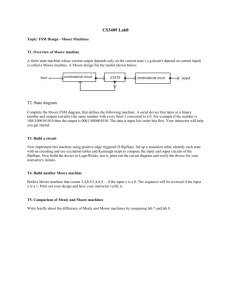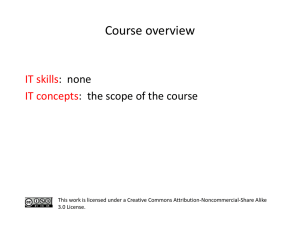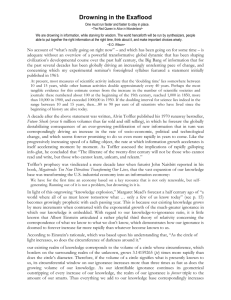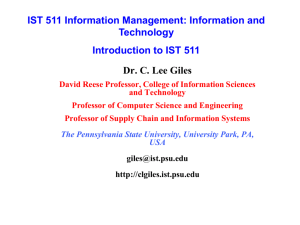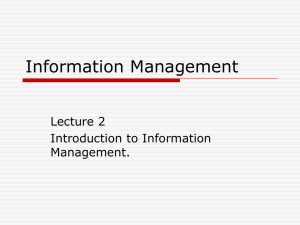What is Information - Professor C. Lee Giles
advertisement
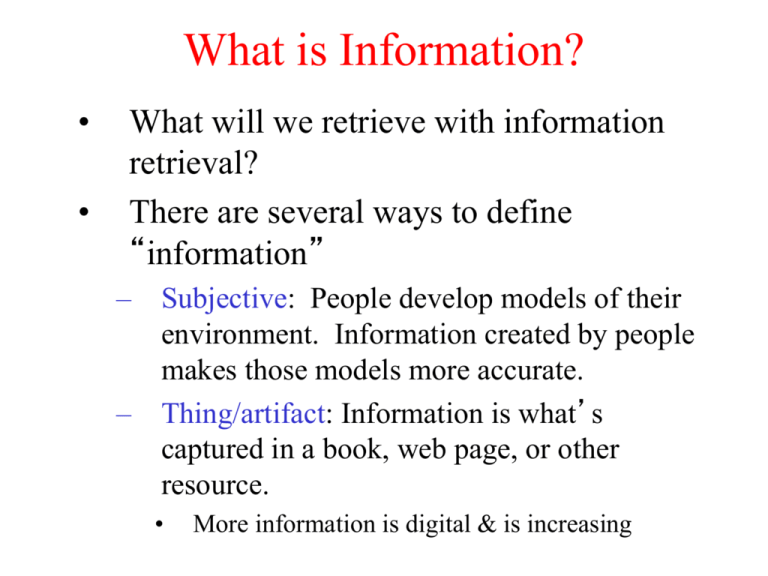
What is Information? • • What will we retrieve with information retrieval? There are several ways to define “information” – – Subjective: People develop models of their environment. Information created by people makes those models more accurate. Thing/artifact: Information is what’s captured in a book, web page, or other resource. • More information is digital & is increasing Information - wikipedia • Information as a concept has a diversity of meanings, from everyday usage to technical settings. Generally speaking, the concept of information is closely related to notions of constraint, communication, control, data, form, instruction, knowledge, meaning, mental stimulus, pattern, perception, and representation. • Many people speak about the Information Age as the advent of the Knowledge Age or knowledge society, the information society, the Information revolution, and information technologies, and even though informatics, information science and computer science are often in the spotlight, the word "information" is often used without careful consideration of the various meanings it has acquired. How much information is there in the world Informetrics - the measurement of information • Stored – – – What can we store What do we intend to store. What is stored. • How do we use it – – Decision making Knowledge discovery Aspects of the Information & Data Age • Much information/data will/can be made and stored digitally • Information/data can be automatically processed, mined, and accessed • Why? Moore’s Law Information Age & Data Age • We have entered the information & data age – • What is the information age? When do we leave it and where do we go next? – – David Weinberger’s Too Big to Know What information was Digitization of Everything: the Zettabytes are coming • • • • • Soon most everything will be recorded and indexed Much will remain local Most bytes will never be seen by humans. Search, data summarization, trend detection, information and knowledge extraction and discovery are key technologies So will be infrastructure to manage this. Digital Information Created, Captured, Replicated Worldwide Exabytes 1,800 1,600 1,400 1,200 1,000 800 600 400 200 0 10-fold Growth in 5 Years! DVD RFID Digital TV MP3 players Digital cameras Camera phones, VoIP Medical imaging, Laptops, Data center applications, Games Satellite images, GPS, ATMs, Scanners Sensors, Digital radio, DLP theaters, Telematics Peer-to-peer, Email, Instant messaging, Videoconferencing, CAD/CAM, Toys, Industrial machines, Security systems, Appliances 2006 Source: IDC, 2008 2007 2008 2009 2010 2011 How much information is there? Yotta • Soon most everything will be recorded and indexed • Most bytes will never be seen by humans. • Data summarization, trend detection anomaly detection are key technologies See Mike Lesk: How much information is there: http://www.lesk.com/mlesk/ksg97/ksg.html See Lyman & Varian: How much information Everything ! Recorded All Books MultiMedia Exa Peta All books (words) .Movi e A Photo http://www.sims.berkeley.edu/research/projects/how-much-info/ A Book 24 Yecto, 21 zepto, 18 atto, 15 femto, 12 pico, 9 nano, 6 micro, 3 milli Zetta Tera Giga Mega Kilo Information Facts Print, film, magnetic, and optical storage media produced about 5 exabytes of new information in 2002. Ninety-two percent of the new information was stored on magnetic media, mostly in hard disks. • • • • How big is five exabytes? If digitized with full formatting, the seventeen million books in the Library of Congress contain about 136 terabytes of information; five exabytes of information is equivalent in size to the information contained in 37,000 new libraries the size of the Library of Congress book collections. Hard disks store most new information. Ninety-two percent of new information is stored on magnetic media, primarily hard disks. Film represents 7% of the total, paper 0.01%, and optical media 0.002%. The United States produces about 40% of the world's new stored information, including 33% of the world's new printed information, 30% of the world's new film titles, 40% of the world's information stored on optical media, and about 50% of the information stored on magnetic media. How much new information per person? According to the Population Reference Bureau, the world population is 6.3 billion, thus almost 800 MB of recorded information is produced per person each year. It would take about 30 feet of books to store the equivalent of 800 MB of information on paper. Moore's Law • Defined by Dr. Gordon Moore during the sixties. • Predicts an exponential increase in component density over time, with a doubling time of 18 months. • Applicable to microprocessors, DRAMs , DSPs and other microelectronics. • Monotonic increase in density observed since the 1960s. First Disk 1956 • IBM 305 RAMAC • 4 MB • 50x24” disks • 1200 rpm • 100 ms access • 35k$/y rent • Included computer & accounting software (tubes not transistors) 1.6 meters 10 years later 30 MB Now - Terabytes on your desk Terabyte external drive for <$100 - 10 cents a gigabyte. In 5 years, 1 cent/gigabyte, $10 for a terabyte? Moore’s Law - Density Storage capacity beating Moore’s law • Improvements: Capacity 60%/y Bandwidth 40%/y Access time 16%/y • 1000 $/TB today • 100 $/TB in 2007 Moores law 58.70% /year TB growth 112.30% /year since 1993 Price decline 50.70% /year since 1993 Most (80%) data is personal (not enterprise) This will likely remain true. Digital Immortality Bell, Gray, CACM, ‘01 Requirements for storing various media for a single person’s lifetime at modest fidelity What is Digital Immortality? • Preservation and interaction of digitized experiences for individuals and/or groups – Preservation and access – Active interaction with archives through queries and/or an avatar (agents) – Avatar interactions for group experiences • Issues: – – – – Archiving Indexing Veracity Access All the world’s libraries on your iPod! SmartPhone NY Times Magazine And you thought finding that song was hard. •Storage is practically free •Much is mobile •Access is crucial •Moore’s law keeps on trucking Low rent min $/byte Shrinks time now or later Shrinks space here or there Automate processing knowbots Immediate OR Time Delayed Why Put Everything in Cyberspace? Point-to-Point OR Broadcast Locate Process Analyze Summarize Filling a terabyte in a year Item Items/TB Items/day 300 KB JPEG 3M 9,800 1 MB Doc 1M 2,900 1 hour 256 kb/s MP3 audio 1 hour 1.5 Mbp/s MPEG video 9K 26 290 0.8 Progress of Science • Thousand years ago: science was empirical describing natural phenomena • Last few hundred years: theoretical branch using models, generalizations • Last few decades: a computational branch 2 æ.ö ça÷ 4pGr c2 ç a ÷ = 3 -K 2 a ç ÷ è ø simulating complex phenomena • Today: (big data/information) data and information exploration (eScience) unify theory, experiment, and simulation - information driven – Data captured by sensors, instruments or generated by simulator – Processed/searched by software – Information/Knowledge stored in computer – Scientist analyzes database / files using data management and statistics – Network Science – Cyberinfrastructure People and Information • People process information based on their experience and context. • Human information processing is affected by emotions and needs. • Your data may be my information • Search engine relevance is the same What is knowledge? • Data - Facts, observations, or perceptions. • Information - Subset of data, only including those data that possess context, relevance, and purpose. • Knowledge - A more simplistic view considers knowledge as being at the highest level in a hierarchy with data (at the lowest level) and information (at the middle level). •Data refers to bare facts void of context. –A telephone number. •Information is data in context. –A phone book. •Knowledge is information that facilitates action. –Recognizing that a phone number belongs to a good client, who needs to be called once per week to get his orders. From Facts to Wisdom (Haeckel & Nolan, 1993) one example of the hierarchy Volume Completeness Objectivity Less is More Wisdom Knowledge Intelligence Information Facts Value Structure Subjectivity What is knowledge? • Knowledge - A more complex view considers knowledge as intrinsically different from information. Instead of considering knowledge as richer or more detailed set of facts, we define knowledge in an area as justified beliefs about relationships among concepts relevant to that particular area. Great Predictions • • • • • • "Computers in the future may weigh no more than 1.5 tons.” Popular Mechanics, forecasting the relentless march of science, 1949 "I think there is a world market for maybe five computers.” Thomas Watson, chairman of IBM, 1943 "Heavier-than-air flying machines are impossible.” Lord Kelvin, president, Royal Society, 1895. "Man will never reach the moon regardless of all future scientific advances."Dr. Lee De Forest, inventor of the vacuum tube and father of television. "Everything that can be invented has been invented.” Charles H. Duell, Commissioner, U.S. Office of Patents, 1899. “Nobody would ever need more than 640 kilobytes of memory on their personal computer,” 1981, Bill Gates. – Other predictions of Bill Gates? Great Predictions RIGHT! • Artificial Intelligence: – speech recognition – Some reasoning; computer beats man in chess – Privacy and security problems – Computers can be a pain in the butt WRONG! • Missed Moore’s law and ubiquity of computers Predicting the future – “The future ain’t what it used to be” Yogi Berra • Can we really predict the future? • Who predicted the implications of the web and search engines? • Social networking? • Can we understand power laws and their implications? – We have no examples of exponential growth in our evolution except plagues. • Can we understand the pervasiveness of computers? Information Science and Data Generation Trends • What does large amounts of information provide? – New opportunities for search! – New discoveries • • • • Business opportunities? Research opportunities? Problems? Wisdom search engine? Thanks to: • Jim Gray, Microsoft • L. Floridi, Hertfordshire • Robert Allen, Drexel • Wikipedia
